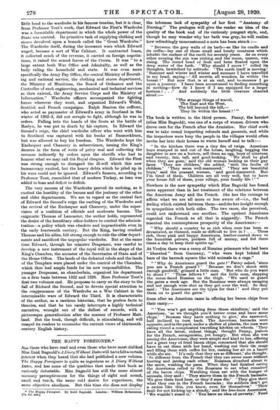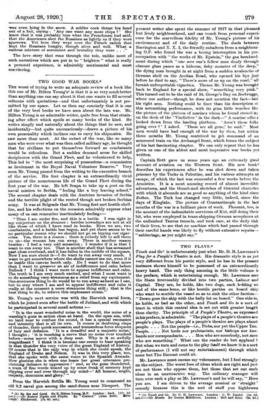ME HAPPY FOREIGNER.* ALL those who have read and even
those who have most disliked Miss Enid 13agnokl's A Diary Without Dates will havefelta certain interest when they heard that she had published a new volume. The Happy Foreigners is quite as ingenious as A Diary Without Dates, and has none of the qualities that made that book so curiously detestable. Miss Bagnold has still the same almost uncanny perceptiveness for the things of sight and sound, smell and touch, the same cold desire for experience, the same objective aloofness. But this time she does not display
• The Happy Foreigner. By Enid Bagnold. London : William Heinemann. [7s. 6d. nel.1 the inhuman lack of sympathy of her first "Anatomy. of : Nursing." The prologue will give the reader an idea of the: quality quality of the book and of its curiously pungent style, and, though he may wonder why her bath was grey, he will realise: how refreshingly unaccustomed a note has.been struck :— " Between the grey walls of its bath—so like its cradle and its coffin—lay one of those small and lonely creatures which inhabit the surface of the earth for seventy years. As on every other evening the sun was sinking and the moon, unseen, was rising. The round head of flesh and bone floated upon the deep water of the bath. Why should I move ? ' rolled ita-- thoughts, bewitched by solitude. The earth itself is moving.' Summer and winter and winter and summer I have travelled in my head, saying—' All secrets, all wonders, lie within the breast ! ' But now that is at an end, and to-morrow I go upon a journey: I have been accustomed to finding something in nothing,—how do I know if I am equipped for a larger
horizon.! And suddenly the little creature chanted aloud :— `The strange things of travel, The East and the West, The hill beyond the They lie within the breast ! ' "
The book is written in the third person. Fanny, the heroine (alias Miss Bagnold), was one of a corps of women drivers who drove cars for the French after the Armistice. Her chief work was to' take round inspecting colonels and generals, and while the inspectors were busy the people in the villages would often, invite her into their houses to warm herself and to talk:-
" In the kitchen there was a tiny fire of twigs. American boys stamped in and out of the house, laughing, begging the daughter to sew on a button, sell them an egg, boys of nineteen and twenty, fair, tall, and good-looking. We shall be glad. when they are gone,' said the old woman looking at their gay faces. They are children,' she added, with the faults of children.' They seem well-mannered.' They are beautiful boys,' said the peasant woman, and good-mannered. But I'm tired of them. Children are all very well, but to have your house full of them, your village, your family life ! ' " Nowhere is the new sympathy which Miss Bagnold has found more apparent than in her treatment of the relations between the American Army and the French. She has the courage to affirm what we are all more or less aware of—i.e., the bad feeling which existed between them—and she has insight enough to sympathize with both sides. The two races, she perceived, could not understand one another. The opulent Americana regarded. the French as all that is niggardly. The French resented the contemptuous prosperity of the Americans:— " Why should a country be so rich when ours has been so devastated, so thinned, made so difficult to live in ? . . . These rich, these pink and happy Americans, leather-coated down to the humblest private, pockets full of money, and fed three times a day to keep their spirits up."
At Verdun there was a camp of Russian prisoners who had been " liberated " from Germany, " who were kept behind the bars of the barrack square like wild animals in a cage."
" ' Why do Americana guard the gate ? ' Fanny asked, 'since you are a French guard ? Because we don't shoot with enough goodwill,' grinned a little man. But who do you want to shoot ? " Those fellows ? ' said the little man, slapping the moon-faced Russian on the thigh. We used to guard the gates a week ago. But the Russians were always escaping and not enough were shot as they got over the wall. So they said : The Americans are the types for that ! ' and they put them on to guard the gates."
Soon after an American came in offering her bacon chips from their camp:— " You won't get anything from those skinflints,' said. the American, so we thought you'd better come and have some chips." Because they have nothing to give,' she answered, half inclined to turn back. The American barracks were opposite, and in the yard, under a shelter of planks, the men were eating round a complicated travelling kitchen on wheels. They have all the latest, richest things, thought Fanny, jealous for the French, antagonistic, yet hungry. But when she was among the Americans, they were simple and kind to her offering her a great tray of fried bacon chips, concerned that she should have to eat them with her hand, washing, out their the mugs and filling them, with coffee for her, making, her sit on a barrel while she ate. It's only that they are so different,' she thought. So different from the French that they can never meet without hurting and jarring each other.' Russians slouched about- in the snow, washing the pans. When they. had finished eating the Americans called to the Russians to eat what remained of the bacon chips. Watching them eat with- the hunger of animals, they said : They starve them in the. French barracks. We give them food here, or they'd sure die.' They give them what they can in the French barracks ; the soldiers don't get a ration like this, you know, even for themselves.' Their fault for not kicking up a shindy,' said the free-born Americans. We wouldn't stand it.' You have-no idea.ok. poverty.' Food was even lying in the snow. A soldier cook thrust his head out of a hut, crying : ' Any one want any more chips ? ' She knew that it was probably true what the Frenchman had said, that the Americans shot the Russians as lightly as if they were sparrows. Yet here they wept over the French ration that kept the Russians hungry, though alive and well. What a curious mixture of sentiment and brutality they were . . ."
The love story that runs through the tale, unlike most of such narratives which are put in to " brighten " what is really a personal experience, is admirably sentimental and most convincing.



































 Previous page
Previous page